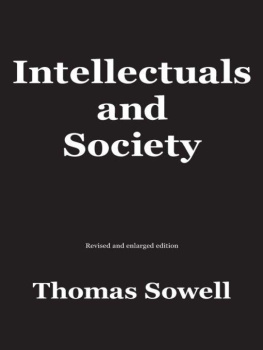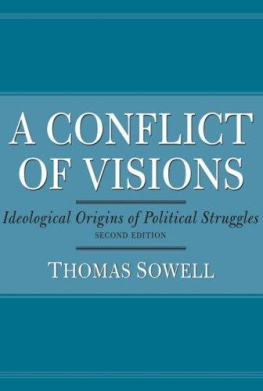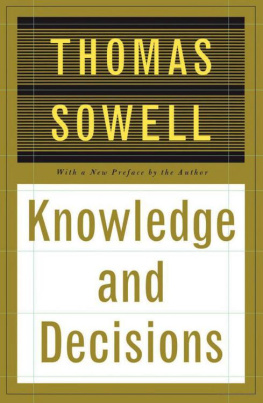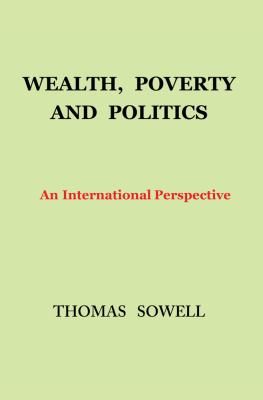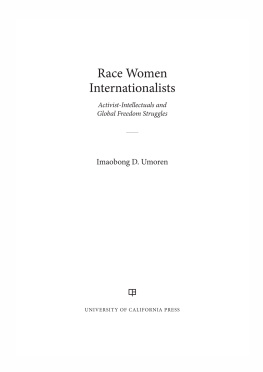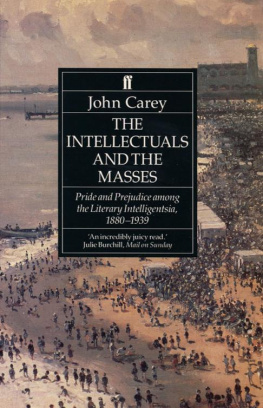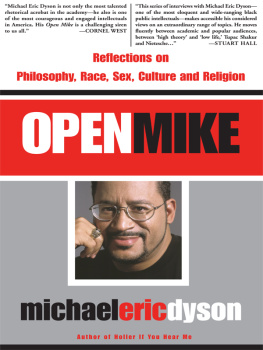INTELLECTUALS
AND RACE
THOMAS SOWELL
BASIC BOOKS
A Member of the Perseus Books Group
New York
Copyright 2013 by Thomas Sowell
Published in 2013 by Basic Books,
A Member of the Perseus Books Group
Portions of this text were previously published in the paperback edition of the Authors work Intellectuals and Society, published in 2012 by Basic Books.
All rights reserved. No part of this book may be reproduced in any manner whatsoever without written permission except in the case of brief quotations embodied in critical articles and reviews. For information, address Basic Books, 250 West 57th Street, 15th Floor, New York, NY 10107.
Books published by Basic Books are available at special discounts for bulk purchases in the United States by corporations, institutions, and other organizations. For more information, please contact the Special Markets Department at the Perseus Books Group, 2300 Chestnut Street, Suite 200, Philadelphia, PA 19103, or call (800) 810-4145, ext. 5000, or e-mail .
Library of Congress Control Number: 2013930756
E-book ISBN: 978-0-465-05870-9
10 9 8 7 6 5 4 3 2 1
The gods mercifully gave mankind this little moment of peace between the religious fanaticisms of the past and the fanaticisms of class and race that were speedily to arise and dominate time to come.
G.M. Trevelyan
CONTENTS
I ntellectuals have had a powerful effect on racial and ethnic issues, in countries around the world, for at least the past hundred years and there is no sign that their influence will not continue, for better or worse, in the generations ahead. Even within a given country, such as the United States, that influence has been exercised in diametrically opposite directions at different times, promoting racial segregation and eugenics in the early twentieth century, and then civil rights and affirmative action in the later decades of that century. In other countries and in different eras, intergroup differences have led to even more varied and extreme consequences, including outright civil war and mass murder.
Such issues and patterns will be explored in the chapters that follow. Most, but not all, of these chapters first appeared in a special section on race that was added to the revised edition of a much larger and more sweeping study, Intellectuals and Society. Here I have belatedly taken the advice of my research assistant Na Liu, and published these chapters in a separate book for those who wish to focus on racial issues, rather than take on the larger and more time-consuming task of traveling on a more sweeping journey across the landscape of intellectuals influences on issues ranging from economics to law to war and peace.
New chapters have been added to this book, including the last chapter exploring current trends, in hopes of discerning their implications for the future. The chapters that precede this effort to foresee what lies ahead should tell us enough about what has already happened to make it obvious how large are the stakes and how difficult the choices facing this generation and those that will follow. If this book succeeds in simply demonstrating through its facts and analysis how inadequate, and even dangerous, the currently fashionable assumptions and catch phrases about race are, it will have achieved its purpose.
L ike many things that people are reluctant to discuss in polite society, or to discuss honestly, race is too important to be ignored or worse yet to think about only in the safe conventions and evasive phrases of our time. Too much of the history of race, in countries around the world, has been a story of hostility and hatred, and often a story written in blood. Ignorance about race is a luxury that few people of any race can afford. Misinformation is even worse, even when it is well-meaning misinformation.
The emotional difficulties of discussing race are matched by the intellectual difficulties. These difficulties begin with defining race itself. Ideally, we might think of a race as a set of people genetically and indelibly different from others in physical characteristics of one sort or another. But the ideal and the reality can differ as much when it comes to race as in any other aspect of human life. People have been singled out for racial discrimination, or even extermination, who looked so much like other members of the society in which they lived that they had to be forced to dress differently or to wear identifying insignia. Some have defined race broadly, such as black, white and yellow races, while others have considered Anglo-Saxons, Slavs and Celts to be different races. Racial intermixtures complicate definitions even more.
Race is not entirely in the eye of the beholder, but it is a social concept with a biological basis. A stricter definition could lose touch with realities in societies where intermarriage is sharply increasing. Nor is intermarriage the ultimate solution to racial problems that many once thought. Jews in Germany in the 1920s had high rates of intermarriage, but that did not stop the rise of Hitler in the 1930s or the Holocaust in the 1940s. Indeed, intermarriage led to larger numbers of offspring being classified as Jews, with tragic consequences. Arbitrary demarcations and inconsistent definitions of race have marked societies preoccupied with race, including the South of the Jim Crow era in the United States and white-ruled South Africa of the apartheid era.
Many have yearned for a society where race was irrelevant, and some saw the election of the first black President of the United States as a major step toward that kind of society. But polls on support for, and opposition to, that president among different ethnic groups are just one sign of continuing racial polarization. In short, no matter how ultimately irrelevant race may seem to some, racial issues show no sign of going away. They cannot be ignored. The only question is how we confront them.
That is a special question when it comes to intellectuals, because their views can influence the way millions of other people see race, as the tendencies, preconceptions and conclusions of the intelligentsia spread through the media and educational institutions from the schools to the universities. For better or worse, intellectuals have played a large role in racial issues in many countries around the world. In the United States, they have played opposite roles on racial issues in the early twentieth century as contrasted with the late twentieth century. These roles and these issues are explored in the chapters that follow, leading to many conclusions very different from those currently prevailing in the media, in politics or in academia.
Both intellectuals and race are words with many elusive definitions. By intellectuals is meant here people in a particular occupation namely, people whose work begins and ends with ideas. It is an occupational designation, rather than an honorific title, and implies nothing about the mental level of those in that occupation. Chemists or chess grandmasters may be of equal or greater mental accomplishment, but they are not intellectuals because their work ends with an outcome subject to empirical verification by known standards, while the outcomes of the work of intellectuals are subject essentially to peer consensus. Even in academia, professors of medicine or engineering are not what come to mind when intellectuals are discussed, even though they may be the mental equals or superiors of professors of sociology or literature.
These are not just verbal issues about nomenclature. Any attempt to have rational discourse requires that those with different views have a common language in which to discuss their differences. And there is no subject more in need of rational discourse than is the subject of race.


